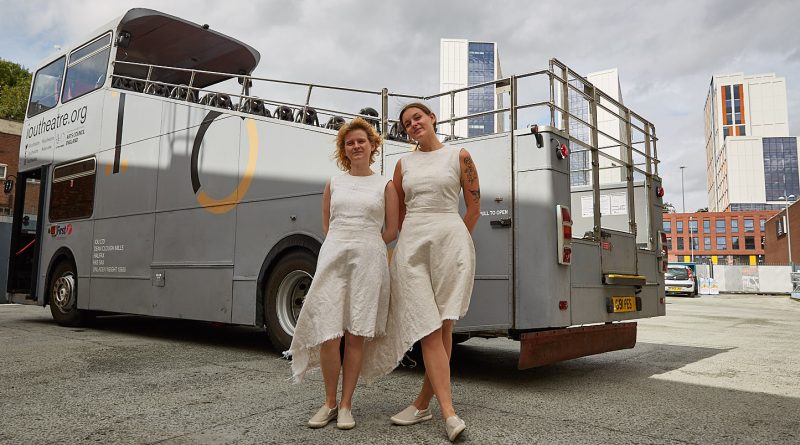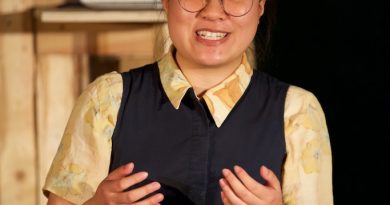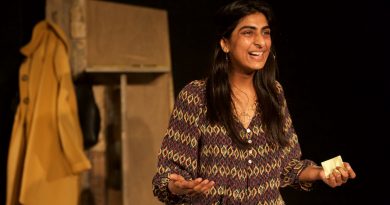Rear View (IOU Theatre, Festival of Imagineers, Coventry, 21 September 2018)
review by Stella Backhouse
Alarm bells started ringing when Cecilia Knapp unexpectedly began to speak. “I am sixty-five years old,” she said. Sixty five struck me as a strange age to pretend to be (in reality, Knapp is much younger). I wondered if it signified a twenty or thirty-something’s idea of really, really ancient. Speaking as someone who has not yet entered her seventh decade – but will do so all too soon – I didn’t know whether to laugh or cry.
Until that moment, Knapp had presented herself as the silent model in a life-drawing class. The audience were the students, attempting brief excercises in proportion, outline and shading. Most of us quietly put down our pencils as Knapp continued to speak. Our efforts, she said, were all about her outer form – the bend of her elbow, the curve of her shoulder. But within her was another person, a person with dreams, with passions, and a “tangled mess inside”. This was the person she wanted us to see. Fair enough.
But had Knapp been an actual middle-aged woman, she might have known that one of our most profound experiences is invisibility. Certainly, no one sees your tangled mess inside. But no one sees your arms or shoulders either, or any other part of your body. And while the removal of the sexual gaze might come as relief (not that the life-drawing class was presented as sexual; Knapp was fully clothed), its replacement is a world where to be acknowledged as even present counts as a win.
And this was my biggest problem with Rear View, written and performed by Cecilia Knapp in conjunction with IOU Theatre, and shown in Coventry as part of the Festival of Imagineers: a woman still in youth’s sweet orchard cannot know how it feels when the leaves turn brown. And hello! – invisibility aside – mostly it feels like it always did. Which is why Knapp’s portrayal of middle-aged women’s lives as nothing but sadness, grief and regret was so wide of the mark, it verged on depressing.
That’s not to say that Rear View did not give food for thought. Abandoning the life drawing class, we joined Knapp’s nameless character on a revelatory journey through her back story. For this, we boarded IOU’s specially converted double-decker bus, whose open-top rear has been converted to the tiered seating arrangement of an auditorium. We then set off on an evocative journey around a collection of mostly waste ground locations just outside Cov Ring Road.
The bus was a great device. Passers-by became the set, but as they stared and waved at the spectacle of an unusual vehicle, we, the passengers, in our turn became theatre to them. This interconnectedness also reflected Knapp’s themes of the briefest encounters imprinting themselves in ways we may not know, and how we become ourselves through art.
The finer details of her character’s life were left vague, but there were hints of bereavement, lost love, dead-end jobs, pervasive restlessness and an inability to ‘settle down’. At each bleak stop, Knapp was mysteriously waiting to tell of a life randomly shaped by conversations with individuals who were in some way damaged.
They included a tattoo artist who “though the world had beaten her blue…still saw beauty in all of it”; a casually-encountered woman whose eyes, full of tears, “had lids like baby turtles”; and a laid-off factory worker “with hands like underpasses, graffitied by lines”. There was much to admire in the quality of Knapp’s lyricism. But as a meditation on the lives of older women, I couldn’t relate to it at all.
Pace Brexit (I did briefly wonder if Rear View was actually about Brexit), people my age do not spend their time lamenting the past. We’re Had-It-All Baby Boomers, for God’s sake! The world is our banana! I’m as forward-facing as I’ve ever been, and rather than be told by someone half my age how someone who is my age is supposed to feel, I’m much more interested in learning about younger people’s perspectives. As for invisibility – even though Rear View was about a middle-aged woman, it made me feel more invisible than ever; it told me I can’t be heard, unless someone younger and better-looking speaks for me.
Performance ended, I got off the bus. Some members of the audience, I noticed, had been handed what looked like evaluation sheets. No one offered one to me, of course. Unnoticed, I slipped away into the afternoon.
Image by Andrew Moore





